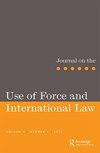应请求提供军事援助和反对使用武力的一般理由:同意作为禁止使用武力的辩护
Q3 Social Sciences
Journal on the Use of Force and International Law
Pub Date : 2020-07-02
DOI:10.1080/20531702.2020.1805963
引用次数: 1
摘要
同意是一种辩护还是禁止使用武力定义的一部分?主流的答案是将(不)同意解读为禁令的定义。因此,该规则将只禁止非自愿的武力。在本文中,我对这种方法提出了质疑。这种做法意味着,国际社会没有反对武力的一般理由,双方同意的武力是无害的,也不需要辩解。然而,使用武力,无论是国内还是国际武力,总是损害或威胁损害国际和平——这是联合国的首要宗旨——因此,维护国际和平必须被视为反对武力的一般理由。此外,无论何时使用武力,包括在征得同意的情况下,国际行为体都会提出并期待理由。为了反映反对武力的一般理由,禁令必须将同意排除在其定义之外。同意必须被重新定义为辩护。本文章由计算机程序翻译,如有差异,请以英文原文为准。
Military assistance on request and general reasons against force: consent as a defence to the prohibition of force
ABSTRACT Is consent a defence or part of the definition of the prohibition of force? The mainstream answer has been to read (non)consent into the definition of the prohibition. The rule would thus prohibit only non-consensual force. In this article, I challenge this approach. This approach implies that there is no general reason against force in international society, that consensual force is not harmful and does not call for justification. And yet, the use of force, whether internal or international, always harms or threatens harm to international peace – the paramount purpose of the United Nations – so that maintaining international peace must count as a general reason against force. Moreover, international actors offer and expect justifications whenever force is used, including with consent. To reflect the general reason against force, the prohibition must exclude consent from its definition. Consent must be recast as a defence.
求助全文
通过发布文献求助,成功后即可免费获取论文全文。
去求助
来源期刊

Journal on the Use of Force and International Law
Social Sciences-Law
CiteScore
1.10
自引率
0.00%
发文量
13
 求助内容:
求助内容: 应助结果提醒方式:
应助结果提醒方式:


